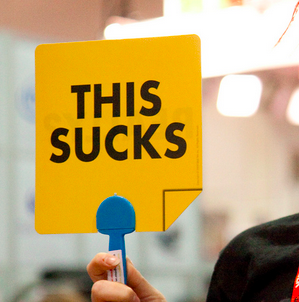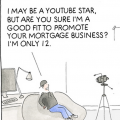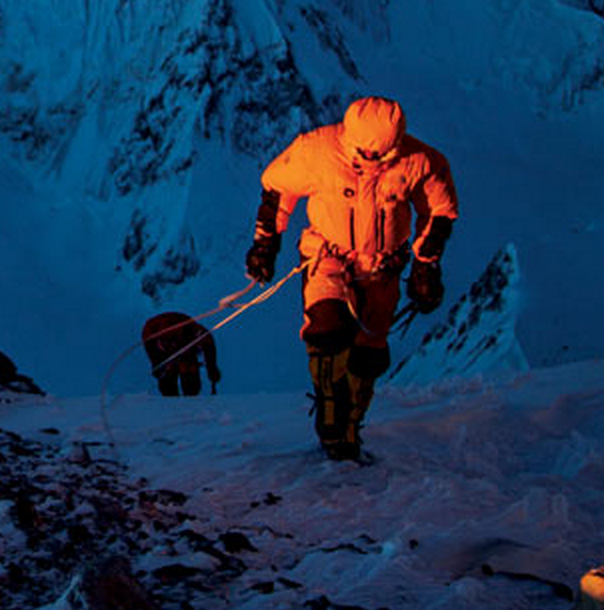
Awesome In-Flight Videos from the KLM Cockpit
Leave your thoughts Ever wonder how dozens of flights can safely cross the Atlantic at the same time, despite the fact that much of the journey includes no radar coverage?
Ever wonder how dozens of flights can safely cross the Atlantic at the same time, despite the fact that much of the journey includes no radar coverage?

 Ever wonder how dozens of flights can safely cross the Atlantic at the same time, despite the fact that much of the journey includes no radar coverage?
Ever wonder how dozens of flights can safely cross the Atlantic at the same time, despite the fact that much of the journey includes no radar coverage?


This is a quest case study. (Read others or nominate yourself.)
Currently a manager at Sbarro, Chris Strub is a be a pretty "normal" guy who had an idea - to spend at least one night in the lower 48 states - and made it happen. Here's how:
Introduce yourself and your quest.
I'm a 29-year-old native New Yorker currently living in Greenville, South Carolina. As I grew up, I was constantly told I could “be whatever I wanted to be.” I sat at my college graduation listening to successful people offering vague advice like this, rife with buzzwords. But I’d never pigeonholed my career goal. Even though I’d had great jobs, I felt like I still had an open book ahead of me. I didn't want to be defined by my vocations - I wanted to be defined by my dreams.
And pushing the limits of social media through travel was my calling. So I decided to take a 90-day solo road trip around the lower 48 states, staying a night in every state.

 I'm proud of my stamps and visas, and I often get a double-take from immigration officers around the world when presenting my passport—but this guy has gone much further.
I'm proud of my stamps and visas, and I often get a double-take from immigration officers around the world when presenting my passport—but this guy has gone much further.



I've always liked Trent Hamm's tagline: "All I care about is making your life not suck." This is what good bloggers, and good people of all kinds, do well. If you're trying to figure out the next step for your blog... or your life... think about how you can make other people's lives not suck.
Taking action on it will probably make you happier, too.
A couple people have suggested that the phrasing of Trent's motto is poor. Can't you make it more positive? they ask.

Link: Chase Sapphire Preferred
Last year we had a celebration for Tyler, our Adventure Czar, when he came home from running a marathon on Antarctica. At the end of the night, I went to pay my tab, and the bartender said, “What is this card that all of you guys have?!” It turned out that of the dozen or so folks that had an open tab at the bar that night, at least half of us were using the Chase Sapphire Preferred. There’s a good reason for that! Our readers are smart. :)
This is a quest case study. (Read others or nominate yourself.)
 For many, driving 17,000 miles with your family would be challenge enough. Nancy Vogel went a step further, and along with her husband and twin sons, decided to bike from Alaska to Argentina over the course of three years.
Nancy's perspective on completing a quest was a favorite story for many readers from The Happiness of Pursuit. Here's more from her.
For many, driving 17,000 miles with your family would be challenge enough. Nancy Vogel went a step further, and along with her husband and twin sons, decided to bike from Alaska to Argentina over the course of three years.
Nancy's perspective on completing a quest was a favorite story for many readers from The Happiness of Pursuit. Here's more from her.
I am an ordinary mom who went on an extraordinary journey. Some say I was outrageously foolish, others say I was ludicrously dumb. I don't think I'm either—I'm just a normal mom who wanted a life outside the box. In 2008, I flew to Alaska with my family. Loaded into the belly of the plane were bicycles for the four of us, and all the gear we needed to begin pedaling toward the southern tip of South America, more than 17,000 miles away. We spent the next three years on our quest for the end of the world and finally—after cycling through 15 countries—we arrived in Ushuaia, Argentina on the island of Tierra del Fuego, where the road ended.

Two days ago I went to see Birdman. I’d missed it when it came out, then forgot all about it, then realized it was still showing. Last night it won best picture and many other awards at the Oscars—coincidence, I’m sure. :)
I really liked many aspects of the film, from the amazing drum-only soundtrack to the fact that it was filmed in a single continuous shot. (I don’t entirely know what that means, but it sounds cool.) I also thought it was interesting that much of the coverage of the film at the Oscars said it was primarily a story about ego. I thought it was somewhat about ego, especially in the context of mortality as an actor who formerly played a superhero ages and faces the loss of relevancy and career. But I also thought it was about shame, a concept that isn’t often explored from a masculine perspective. It reminded me of reading Karl Ove Knausgaard, something else I'll write about shortly.

Things I found on long walks in foreign cities, or perhaps when someone posted them on Twitter.

 In reading the transcript of Bob Dylan’s speech at MusiCares, I also liked this part on the origins of his songwriting:
In reading the transcript of Bob Dylan’s speech at MusiCares, I also liked this part on the origins of his songwriting:


The Crisis Text Line provides free support and “active listening" for teens through the method of communication that many people now prefer. Volunteers are available around the clock and communicate with thousands of users in need every day.
The organization’s quantified approach, based on five million texts, has produced a unique collection of mental-health data. C.T.L. has found that depression peaks at 8pm, anxiety at 11pm, self-harm at 4am, and substance abuse at 5am.
Counselors are trained to put texters at ease and not to jump too quickly into a problem-solving mode. Open-ended questions are good; “why” questions are bad. Also bad: making assumptions about the texter’s gender or sexual orientation, sounding like a robot, using language that a young person might not know.If you need help, you can reach the Crisis Text Line by texting START to 741741.

 From time to time people ask my advice about marketing to Generation X or Millennials or any other group of people. When this happens, I always worry.
From time to time people ask my advice about marketing to Generation X or Millennials or any other group of people. When this happens, I always worry.

Adventure photographer Cory Richards almost died in an avalanche while descending from a mountain in Pakistan, but he lived and the experience changed his life.
In a short (and amazing) video, he shares on “the richness that comes through struggle.”“I’ve never been comfortable in the place that I’m in. I can’t stop and sit. It’s a constant engine that’s driving me to the things that are unknown to me."



This is a quest case study. (Read others or nominate yourself.)
When I heard about Billy Ulmer's quest to interview people living in tiny houses, I couldn't help but think of Dee Williams, one of the 2014 WDS speakers. Funny enough, she was one of his first interviews! Here's Billy's story. Introduce yourself and your quest.My name is Billy and I’m a writer and photographer from Portland, Oregon. In 2014, I completed the first phase of what has become an ongoing quest: I visited 10 tiny houses across America, did in-depth interviews with the people that designed, built and live in them, and shared their inspiring stories. I met people in Oregon, Washington, Idaho, New Mexico, Texas, Ohio, New York and West Virginia, and learned how choosing an unlikely home changed their lives.



I met a guy who was a busy executive at a startup in Silicon Valley. His family, a wife and three young kids, lived several states away. He lived in a hotel during the week, worked every evening, and flew home every weekend before returning to the office on Monday morning. Not a very dedicated family guy, right?
On the contrary. When I asked him about living in two cities, he admitted it was sometimes a challenge. But then he talked about what the weekends were like. “We do everything together,” he said. “We go camping. We bake and cook. We play hard the whole weekend long. I know I have to go back on Monday, so I'm constantly thinking about how to squeeze as much time and as many experiences in as we can.”
His family had discussed the arrangement of him being away mid-week, and they re-evaluated it twice a year. So far, at least, it was working.


If you liked the Japanese tradition, here's another one from this side of the Pacific:
“Older people often draw as much happiness from ordinary experiences — like a day in the library — as they do from extraordinary ones.Personally I'm still a fan of jetsetting about on international trips, so I don't think you have to choose between travel and "ordinary experiences"—but yes, a day at the library can bring a lot of joy.
Link: Affixing More Value to the Ordinary Experiences of Life